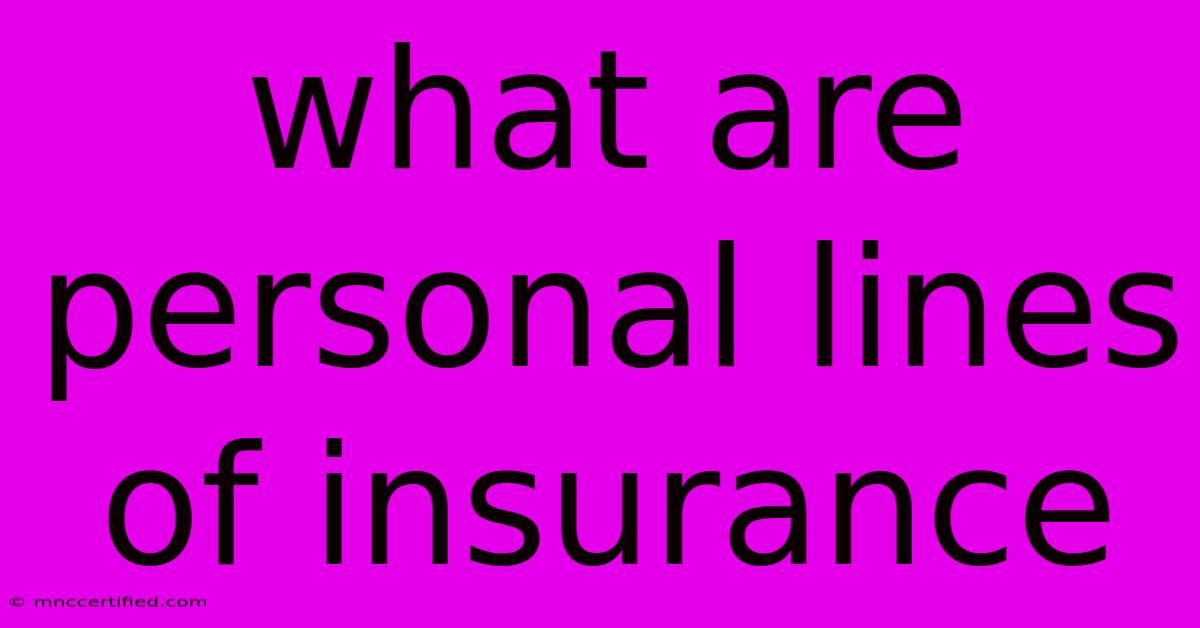What Are Personal Lines Of Insurance

Table of Contents
What are Personal Lines of Insurance? Protecting What Matters Most
Life is full of uncertainties. Accidents, illnesses, and natural disasters can strike at any time, leaving you vulnerable financially and emotionally. That's where personal lines of insurance come in, providing a safety net to protect your most valuable assets and loved ones.
This comprehensive guide will delve into the world of personal lines insurance, exploring its different types, benefits, and how it can safeguard your financial well-being.
Understanding Personal Lines Insurance: A Simple Explanation
Personal lines insurance is a category of insurance policies designed to protect individuals and their families from financial losses arising from a wide range of personal risks. It encompasses various types of coverage, each tailored to specific needs and situations.
Think of it as a shield against life's unexpected challenges. It covers your:
- Personal property: Your home, belongings, and even your car.
- Personal liability: Protecting you against financial consequences if you're held responsible for causing harm to others.
- Personal well-being: Ensuring financial stability in case of illness, disability, or death.
Key Types of Personal Lines Insurance
1. Homeowners Insurance:
This vital policy protects your home and personal belongings from various perils, including:
- Fire: Damage caused by fire, smoke, and explosions.
- Theft: Loss of possessions due to burglary or robbery.
- Natural disasters: Protection against hurricanes, earthquakes, floods, and other disasters.
- Liability: Coverage for injuries or damages caused to others on your property.
2. Auto Insurance:
A legal requirement in most states, auto insurance provides financial protection for:
- Property damage: Covering repairs or replacement costs for your vehicle if it's damaged in an accident.
- Bodily injury: Protecting you against medical expenses and other related costs if you injure someone in an accident.
- Uninsured/underinsured motorist: Coverage for accidents caused by drivers without adequate insurance.
3. Renters Insurance:
If you're renting, renters insurance protects your belongings from theft, fire, and other covered perils. It also provides liability coverage for accidents that occur on your property.
4. Personal Umbrella Insurance:
This supplemental policy provides additional liability protection beyond your primary policies. It covers significant legal judgments or settlements that exceed your other insurance limits.
5. Life Insurance:
This policy provides financial security for your loved ones in the event of your death. It ensures they have the necessary funds to cover expenses like mortgages, debts, and living costs.
6. Health Insurance:
Health insurance helps cover medical expenses, including doctor visits, hospital stays, prescription drugs, and preventive care. It plays a critical role in protecting your financial well-being in case of illness or injury.
7. Disability Insurance:
Disability insurance provides income replacement if you're unable to work due to an illness or injury. It helps maintain your financial stability during a challenging period.
8. Long-Term Care Insurance:
This specialized policy covers the cost of long-term care services, such as nursing home care or assisted living, if you become chronically ill or disabled.
Benefits of Having Personal Lines Insurance
- Financial protection: Provides a safety net against unexpected expenses, preventing catastrophic financial losses.
- Peace of mind: Knowing you're insured reduces anxiety and worry about potential risks.
- Legal compliance: Auto insurance is a legal requirement in most states, and homeowners insurance is often mandated by mortgage lenders.
- Protection for your loved ones: Ensures their financial security in case of your death or disability.
Finding the Right Personal Lines Insurance
Choosing the right personal lines insurance involves careful consideration of your individual needs and circumstances. Factors to consider include:
- Your assets: The value of your home, car, and other belongings.
- Your risk profile: Your likelihood of experiencing certain risks, such as accidents or natural disasters.
- Your budget: The cost of insurance premiums.
- Your coverage needs: The specific types and levels of protection you require.
Consulting with an insurance agent or broker is highly recommended. They can help you assess your needs and find the best policy options that align with your budget and lifestyle.
Conclusion: Protecting Your Future with Personal Lines Insurance
Investing in personal lines insurance is a smart decision that protects your financial security and provides peace of mind. By carefully choosing the right coverage for your individual needs, you can shield yourself and your loved ones from life's unexpected challenges and ensure a brighter future.

Thank you for visiting our website wich cover about What Are Personal Lines Of Insurance. We hope the information provided has been useful to you. Feel free to contact us if you have any questions or need further assistance. See you next time and dont miss to bookmark.
Featured Posts
-
Commercial Vehicle Insurance Ontario
Nov 11, 2024
-
Premier League United Dominate Leicester 3 0
Nov 11, 2024
-
Functional Medicine Doctor Insurance
Nov 11, 2024
-
8 3 Renters And Homeowners Insurance
Nov 11, 2024
-
Chemical Bonds Ionic Bonds Worksheet
Nov 11, 2024